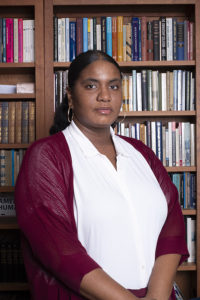Meet the New AHA Staff Member: Anaiise Diaz

Please welcome the American Humanist Association’s new social justice and legislative assistant, Anaiise Diaz!
TheHumanist.com: What is your educational and work background?
I attended Rutgers University, graduating with a double major in criminal justice and sociology with a minor in international affairs. I am currently in a graduate program at George Washington University, pursuing a master’s in political management. My previous work experience has been predominantly with non-profit organizations and community action agencies in the State of New Jersey, specifically in the Youth and Family Services Department.
TheHumanist.com: How did you first learn about humanism?
Humanism is something new to me, but I have always had humanistic ideas. I consider myself to be spiritual and in touch with my Afro-indigenous roots. Humanism, as I have come to learn, recognizes the potential value and goodness of human beings, emphasizes common human needs, and seeks to utilize rationality, not faith, to solve human problems. I believe in the good of humankind. I believe in a more humane society. I believe in science. How much more humanistic can it get?
TheHumanist.com: Did you grow up in a traditional religious faith? How did it impact you?
I grew up in an eclectic household. Both my parents are from the Dominican Republic but hold two drastically different religious points of view. My father grew up in a culturally Dominican household. His mother was a woman grounded in Afro-Indigenous culture and religion, and his father was a traditional Catholic who would only go to services on major holidays. My mother grew up in a conservative household where Judaism influenced a part of her life and was mixed with Catholic/ Protestant ideologies of the island. From these two “star-crossed” lovers I came into the picture. Growing up as I did, I have the tools to question myself and the faiths around me, which is something I find myself doing daily.
I grew up in a rich environment of cultural and religious diversity. Being from Newark, New Jersey, a city where a devout Portuguese Catholic and a Guyanese Muslim can sit and have coffee shapes my view on faith. My parents, regardless of their different worlds, have taught me to be good, to do good, and to seek the overall good for my world and the world of others. With my community and religious upbringing, I have come to understand the world through a lens that is accepting of all religions, faiths, and practices. Learning and understanding the religions around me has given me the ability to understand that the common good for humankind is what really matters.
TheHumanist.com: What interested you most about working for the American Humanist Association?
As all good things in life, timing is essential. I wanted to shift my gears from the education non-profit sector to something that dealt with overall social justice initiatives. I loved working with children, but I saw the injustices and the politics that came to play with the hefty decision-making of the Education Department and its effects on low-income students. It pained me to see how much of a disadvantage they are at compared to their white, cis, economically advantaged counterparts. I knew that in order to create change you have to be in a place where the people around you agree and also want to see change happen. In working with the American Humanist Association, I am excited to bring my knowledge and passion to the advancement of humanism and to see how I develop and grow in the organization.
TheHumanist.com: What book has influenced you the most?
The book that really influenced me is The Absolutely True Diary of a Part-Time Indian by Sherman Alexie. I will never forget the teacher who gave me that treasure my sophomore year of high school (shout-out to Professor Aguilera!). It was the very first time I read a book that wasn’t written by a white author. It meant so much to me to see that Brown, Latinx, Queer, and Black writers existed. The book discusses the issues that are too common in my community: alcohol abuse, poverty, bullying, violence, sexuality, and mental disability. The book sent me the message: no, you are not alone, and yes, we are all suffering from the impacts of colonialism in our communities. I still read the book from time to time.
TheHumanist.com: If you could have dinner with any three people in the world (living or dead), who would they be and why?
I would invite Eartha Kitt, Barack Obama, and Alexandria Ocasio-Cortez. Eartha Kitt, known for playing Catwoman, was an iconic feminist figure and an advocate for LGBTQ and human rights. She would be an interesting person to speak to. Alexandria Ocasio-Cortez—I’m inspired by her work and how vocal she is. Finally, I would love to have a chat with Barack Obama and the others to discuss current issues. These three iconic and revolutionary people in one room would be a conversation worth having.
